The COMBAT project addresses the relation between public policies and anti-discrimination/human rights legal frameworks that protect against discrimination on the grounds of race, ethnic origin, colour or nationality in Portugal. The project addresses a key research question: how institutional racism is being tackled or silenced in current public policy-making and anti-discrimination legal provision with a focus on two key areas: education and housing.
Through an analysis of the past and present of the struggles against racism in Portugal and the wider European context, this project proposes a sociological understanding of the main issues currently raised in this area, such as the permeability of institutions to racial discrimination; the absence of a sound public debate on racism that engages with grassroots movements and associations; the under-reporting of racist crime and discrimination to the competent bodies; the tendency to consider racism just as isolated events and not as integrated within institutional practices and arrangements.
The project aims to address and engage in dialogue with: policy makers; legal experts; immigrant and anti-racist NGOs and associations; grassroots movements, journalists; academics.
Keywords:
Institutional racism; Anti-discrimination law; European Union; public policies; human rights
Duration: 1 June 2016 – 30 April 2020
Funding: Portuguese Foundation for Science and Technology – FCT and co-funded by the European Fund for Regional Development (FEDER) through the COMPETE 2020 operational program – PTDC/IVC-SOC/1209/2014 – POCI-01-0145-FEDER-016806.
Total funding: 132.338,00 Eur
FEDER funding: 112.487,30 Eur
National funds, OE: 19.850,70 Eur
The COMBAT project addresses the relation between public policies and anti-discrimination/human rights legal frameworks that protect against discrimination on the grounds of race, ethnic origin, colour or nationality in Portugal. The project addresses a key research question: how institutional racism is being tackled or silenced in current public policy-making and anti-discrimination legal provision with a focus on two key areas: education and housing.
Through an analysis of the past and present of the struggles against racism in Portugal and the wider European context, this project proposes a sociological understanding of the main issues currently raised in this area, such as the permeability of institutions to racial discrimination; the absence of a sound public debate on racism that engages with grassroots movements and associations; the under-reporting of racist crime and discrimination to the competent bodies; the tendency to consider racism just as isolated events and not as integrated within institutional practices and arrangements.
The project aims to address and engage in dialogue with: policy makers; legal experts; immigrant and anti-racist NGOs and associations; grassroots movements, journalists; academics.
Keywords:
Institutional racism; Anti-discrimination law; European Union; public policies; human rights
Duration: 1 June 2016 – 30 April 2020
Funding: Portuguese Foundation for Science and Technology – FCT and co-funded by the European Fund for Regional Development (FEDER) through the COMPETE 2020 operational program – PTDC/IVC-SOC/1209/2014 – POCI-01-0145-FEDER-016806.
Total funding: 132.338,00 Eur
FEDER funding: 112.487,30 Eur
National funds, OE: 19.850,70 Eur
COMBAT carries out empirical research within the institutional and legal frameworks of the Portuguese State, the EU and other international legal provisions, with a focus on the development and implementation of public policies for integration and anti-discrimination/human rights law.
Key research contexts:
i) Public bodies and institutions such as equality bodies, general-inspectorates and directorates-general;
ii) NGOs and associations that support victims of racial discrimination and develop legal advocacy;
iii) (Inter-)national judicial institutions;
iv) the media (the press and TV networks) and social networks;
COMBAT will identify and analyse the trajectories of complaints and the role of public bodies and grassroots organisations in paradigmatic cases in two key life-spheres: education and housing. Cases will cover school segregation, segregation in housing policies and police brutality in Portugal. Research will foreground the role of anti-racist and legal advocacy organisations in supporting victims, joining administrative procedures and representing complainants. The team will also examine how the media has framed the cases under study: what is newsworthy and what is the understanding of racism and discrimination conveyed in the news.
Ana Rita Alves
Cecília MacDowell Santos
Inês Oliveira
Marta Araújo
Pedro Almeida
Pedro Varela
Silvia Rodríguez Maeso (Principal Investigator)
Ana Rita Alves
Cecília MacDowell Santos
Inês Oliveira
Marta Araújo
Pedro Almeida
Pedro Varela
Silvia Rodríguez Maeso (Principal Investigator)
Ana Flauzina (Federal University of Bahia/Universidade Federal da Bahia)
Bruno Gonçalves (SOS Racismo/ROMED – Mediation for Roma)
Gavan Titley (National University of Ireland, Maynooth)
Jaime Amparo Alves (Department of Black Studies, University of California-Santa Barbara)
Katy Sian (University of York)
Kojo Koram (University of Essex)
Mamadou Ba (SOS Racismo)
Marie-Bénédicte Dembour (Human Rights Centre, Ghent University)
S. Sayyid (University of Leeds)
Thula Pires (Pontifical Catholic University of Rio de Janeiro/Pontifícia Universidade Católica, Rio de Janeiro)
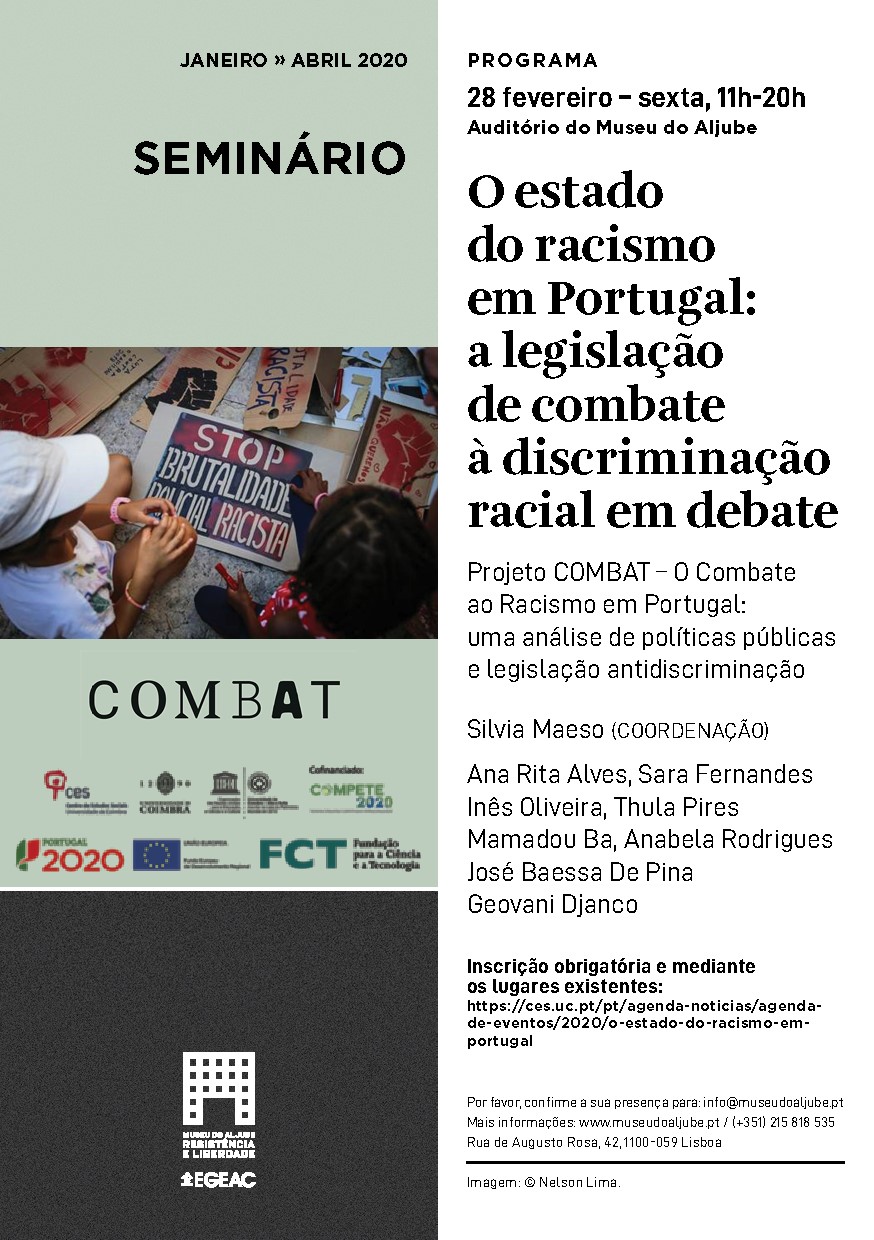
.jpg)
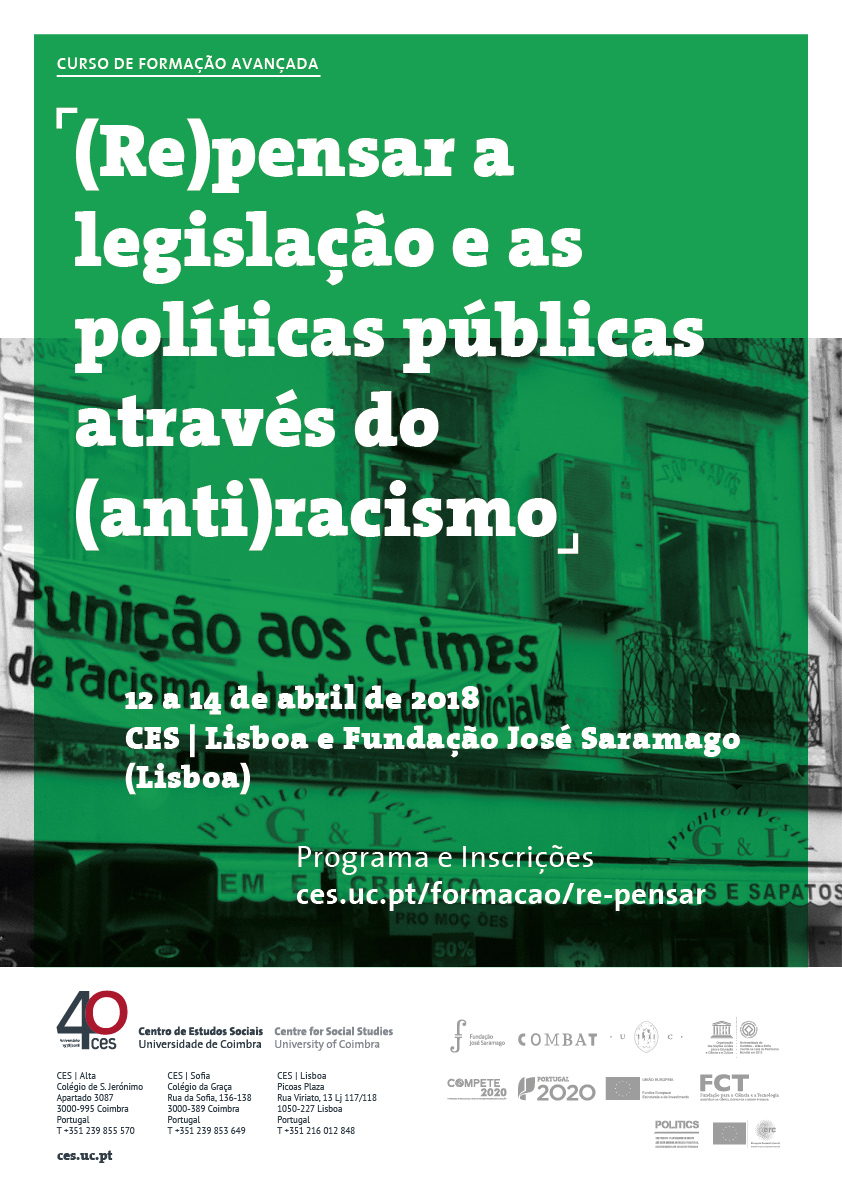
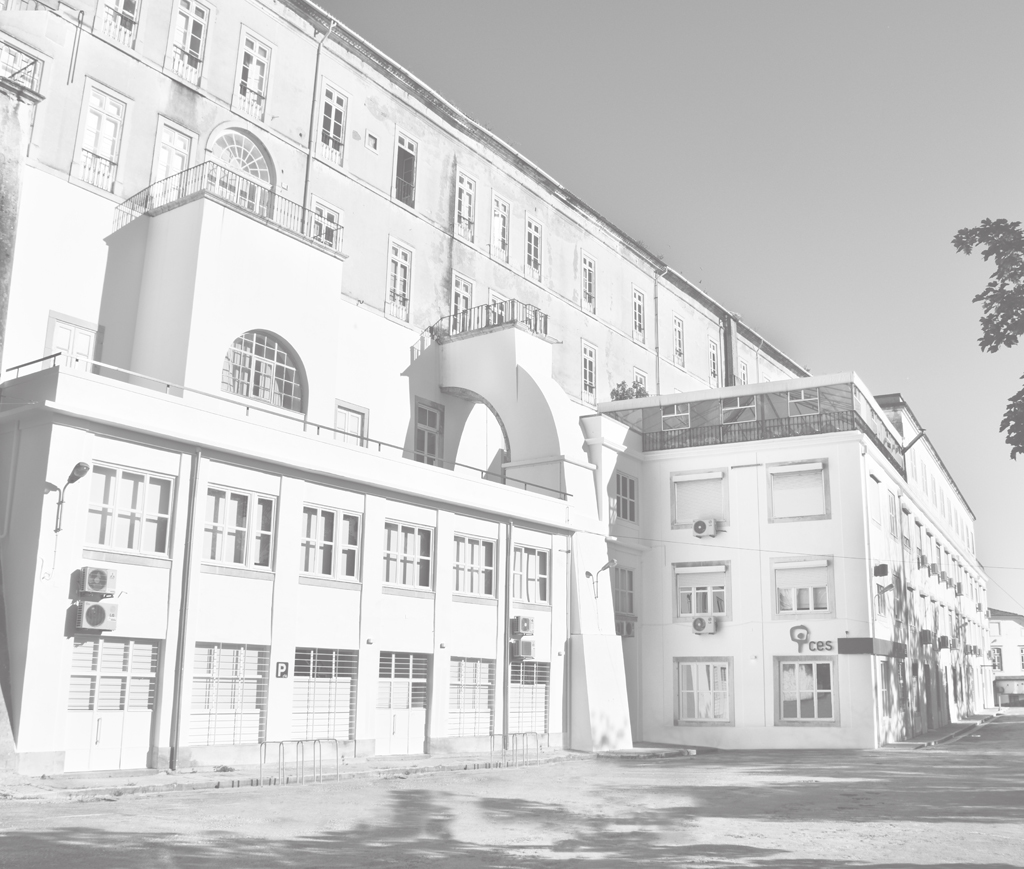
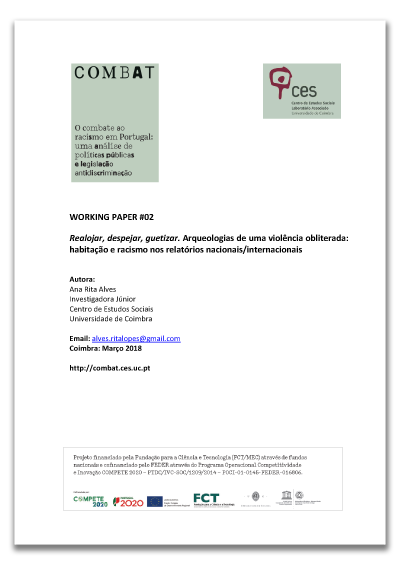 |
Realojar, despejar, guetizar. Arqueologias de uma violência obliterada: habitação e racismo nos relatórios nacionais/internacionais |
 |
Realojar, despejar, guetizar. Arqueologias de uma violência obliterada: habitação e racismo nos relatórios nacionais/internacionais |
Special Issue:
Maeso, Silvia Rodríguez; Baldi, César Augusto (2019), “Repensar a legislação e as políticas públicas desde o anti-racismo em contextos europeus e latino-americanos”, Special Issue of journal: Revista Direito e Praxis, UERJ, Vol. 20, no 3.
https://www.e-publicacoes.uerj.br/index.php/revistaceaju/article/view/44398
Scientific Articles:
Alves, Ana Rita (2019) "‘Para eles, nós não somos humanos!’: habitação, território e a monitorização de violências racializadas em Portugal", Revista Direito e Praxis, 10 (3), 2068-2096.
https://www.e-publicacoes.uerj.br/index.php/revistaceaju/article/view/43878/30315
Araújo, Marta (2019) "À procura do "sujeito racista": a segregação da população cigana como caso paradigmático", Cadernos do Lepaarq (Dossiê 'Comunidades Quilombolas, Negras, Ciganas e Indígenas na América Latina: Racismos Institucional e Epistemológico'), XVI, 31, 147-162.
https://periodicos.ufpel.edu.br/ojs2/index.php/lepaarq/article/view/14940
Maeso, Silvia Rodríguez (2019) "O Estado de negação e o presente-futuro do antirracismo: Discursos oficiais sobre racismo, 'multirracialidade' e pobreza em Portugal (1985-2016)", Revista Direito e Práxis, 10 (3), 2033-2067.
https://www.e-publicacoes.uerj.br/index.php/revistaceaju/article/view/43883
Raposo, Otávio; Alves, Ana Rita; Varela, Pedro; Roldão, Cristina (2019) "Negro drama. Racismo, segregação e violência policial nas periferias de Lisboa", Revista Crítica de Ciências Sociais, 119, 5-28.
https://journals.openedition.org/rccs/8937
Varela, Pedro (2019) "Direito à memória e antirracismo: reivindicar o movimento negro de 1911-1933", Medi@ções - Revista Online da ESE/IPS, “Educação (anti)racista: Que políticas, práticas e perspectivas?”, 7, 2, 86-98.
http://mediacoes.ese.ips.pt/index.php/mediacoesonline/article/view/230
Varela, Pedro; Pereira, José (2019), "As origens do movimento negro e da luta antirracista em Portugal no século XX: a geração de 1911-1933", Revista Buala, 8 Janeiro.
Maeso, Silvia (2018) “‘Europe’ and the Narrative of the ‘True Racist’: (Un-)thinking Anti-Discrimination Law through Race”, Oñati Socio-Legal Series, 8, 6, 845-873.
https://papers.ssrn.com/sol3/papers.cfm?abstract_id=3161645
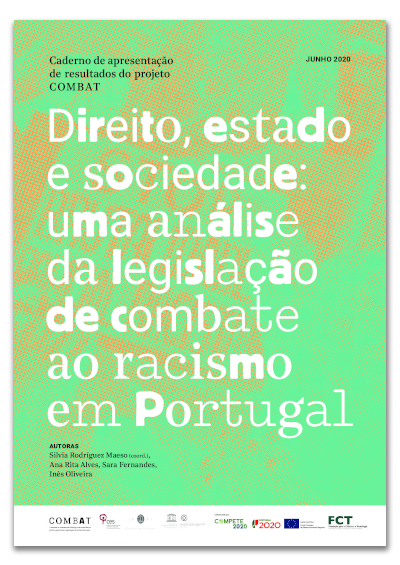 |
Booklet | Direito, estado e sociedade: uma análise da legislação de combate ao racismo em Portugal |
Almeida, Pedro (2012) ‘Futebol, racismo e eurocentrismo. Os média portugueses na cobertura do Campeonato Mundial de Futebol na África do Sul’, Revista Crítica das Ciências Sociais, 98, 103-123.
Alves, Ana Rita (2016) ‘(Pré)Textos e Contextos: Media, Periferia e Racialização’, Revista de Ciências Sociais Política & Trabalho, 44, 91-107.
Araújo, Marta (2013) ‘Challenging Narratives on Diversity and Immigration in Portugal’, in Philip Kretsedemas; Jorge Capetillo-Ponce; Glenn Jacobs (eds.), Migrant Marginality: a Transnational Perspective. New York/London: Routledge, 27-46.
Araújo, Marta (2016) ‘A very “prudent integration”: white flight, school segregation and the depoliticization of (anti)racism’, Race, Ethnicity and Education, 19(2), 300-323 (Published online: 12 Nov 2014).
Araújo, Marta (2019), "À procura do "sujeito racista": a segregação da população cigana como caso paradigmático", Cadernos do Lepaarq (Dossiê 'Comunidades Quilombolas, Negras, Ciganas e Indígenas na América Latina: Racismos Institucional e Epistemológico'), XVI, 31, 147-162.
Maeso, Silvia Rodríguez; Araújo, Marta (2013) ‘A quadratura do círculo: (anti)racismo, imigração e a(s) política(s) da integração em Portugal nos anos 2000’, Oficina do CES, 407.
Maeso, Silvia; Araújo, Marta (2014) ‘The Politics of (Anti-)Racism. Academic Research and Policy Discourse in Europe’, in Wulf D. Hund, Alana Lentin (org.), Racism and Sociology. Berlin: Lit Verlag, pp. 207-237.
Maeso, Silvia & Cavia, Beatriz (2014) ‘Esquivando el racismo: el paradigma de la “integración” en las sociedades europeas y vasca contemporáneas’, in Ignacio Irazutza e María Martínez (org.), De la Identidad a la Vulnerabilidad. Alteridad e integración en el País Vasco contemporáneo. Barcelona: Edicions Bellaterra, pp. 151-194.
Maeso, Silvia (2015) ‘“Civilising” the Roma? The depoliticisation of (anti-)racism within the politics of integration’, Identities. Global Studies in Culture and Power, 22(1), 53-70.
Maeso, Silvia; Araujo, Marta (2017) ‘The (im)plausibility of racism in Europe: policy frameworks on discrimination and integration’. Patterns of Prejudice, 51(1), 26-50.
Maeso, Silvia; Araújo, Marta (2017), ‘The semantics of (anti-)racism in the governance of non-Europeanness: an introduction’, Patterns of Prejudice, 51, 1, 1-8.
Santos, Cecília MacDowell (2012) ‘Mobilização Transnacional do Direito e a Reconstrução dos Direitos Humanos’, in Cecília MacDowell dos Santos (org.), A Mobilização Transnacional do Direito: Portugal e o Tribunal Europeu dos Direitos Humanos. Coimbra: Edições Almedina, 13-27.
European Convention on Human Rights (1950)
Council of Europe | European Social Charter (1961; revised in 1995)
UN International Convention on the Elimination of All Forms of Racial Discrimination (1965)
Penal Code – Portugal (1982) | Article 132 (Aggravated Homicide: if it is determined by racial, religious or political hatred), Article 145 (Qualified offences against the physical integrity), Article 180 (Defamation), Article 181 (Insult), Article 239 (Genocide), Article 240 (Discrimination and incitement to hatred and violence)
European Convention on Human Rights (1950)
Council of Europe | European Social Charter (1961; revised in 1995)
UN International Convention on the Elimination of All Forms of Racial Discrimination (1965)
Penal Code – Portugal (1982) | Article 132 (Aggravated Homicide: if it is determined by racial, religious or political hatred), Article 145 (Qualified offences against the physical integrity), Article 180 (Defamation), Article 181 (Insult), Article 239 (Genocide), Article 240 (Discrimination and incitement to hatred and violence)

